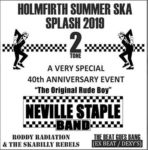 Well, here’s an odd one. This weekend my daughter is working at the Splendour Festival in Nottingham where The Specials are set to play; and here I am in Holmfirth for the Summer Ska Splash, largely featuring music made by the band and their contemporaries, a number of whom are here in Holmfirth today.
Well, here’s an odd one. This weekend my daughter is working at the Splendour Festival in Nottingham where The Specials are set to play; and here I am in Holmfirth for the Summer Ska Splash, largely featuring music made by the band and their contemporaries, a number of whom are here in Holmfirth today.
Funny old world, the world of the ‘bitza’ band. So The Specials and their spinoffs and satellites tour in a variety of configurations, none of which, at the present time include Jerry Dammers.
Very strange.
Anyway, we are to convene early as it is a half-six kick off courtesy of The Beat Goes Bang, a mash-up of former members of The Beat (namely drummer Everett Morton and guitarist Neil Dethridge;) and a former Dexy (Keyboard player Mickey Billingham) along with Jason Ensa, Sean Williams and Theo Hockley. Once through the preliminaries, the band is already blowing up a storm when we get the first one in and boy, are they a good listen! “Too Nice To Talk To” was always a top-drawer tune and it still sounds fresh today, played with affection and enthusiasm. For me, though, and I guess many of the assembled, “Mirror in the Bathroom” is the highlight, the sax break truly evoking the spirit of Saxa. And that Everett Morton; whack. For any reggae-rooted music to hold water, the drummer seriously has to know what he or she is doing and this guy is quality. His performance underpinned a sharp and well-received set. These lads play with a refreshing enthusiasm and spring in their step and it looks and is infectious fun – and I’m bopping away and it isn’t even half seven yet. Can’t help feeling we’re getting our money’s worth here tonight!
Next up after an ugly and gratuitously foul-mouthed DJ set by one Fat Piggy from Sheffield, Roddy Radiation and the Skabilly Rebels. Monsieur Radiation was the guitarist for The Specials on and off through until 2014; but you can tell his heart was only partly ‘in it’. The Specials were always a sort of punk-ska outfit and the punk influence was always an important part of their appeal; and this guitarist was always at the ‘punkier’ edge of the spectrum. And just to underline this, the first thing they do when they come on is gob in the air. It could have been worse.
Roddy Radiation cuts a dapper figure in blue drapes and crepes and full marks to him, the seemingly unbridgeable gap between punk, ska and rockabilly he seems to cross with ease. The two guitar attack is one beautiful noise especially on “Bonedigging”, “Blues Attack” and “Keep on Learning”; but boy, is he grumpy. ‘I’m Roddy Radiation, apparently,’ he grudgingly concedes and it seems the massed ranks of Ben Shermans, pork pie hats and 2 Tone T shirts have drawn his ire for so many people doing the ‘follower’ thing in terms of dressing up.
Oh, come on.
The gig has been billed as a ‘Summer Ska Splash’. It is Saturday night. Most people are here tonight for a bit of a party. Lighten up, for goodness sake. And anyway, since we seem so keen on upholding the ‘revolt into style’ critique, could I perhaps be permitted to point out that the drapes and crepes thing is also A Style, a similarly mass-produced youth style thing. Once upon a time. You don’t see Elton John spitting out the dummy because half the audience insist on wearing big glasses, do you? Enough, already.
That said, they chop through their set with conviction and yes, there are a few in the audience who can’t quite get to it, find it a bit too ‘rock’. And in the interests of journalistic balance I think I ought to say that some should perhaps be a bit more willing to open minds and ears.
I have to say I absolutely loved it and I probably wasn’t in the majority. He’s some player and his band certainly blow some as well. It is self-evident that this guy and his associates have toured the States extensively and they don’t need anyone to show them how to do the deed. He includes an aggressive and pointy “Rat Race” early in the set and does what for me was the musical highpoint of the entire proceedings in a killer version of “Do Nothing”, for me one of the most underrated Specials songs ever; musically a sort of distorted and creepy version of Keith West’s “Excerpt From a Teenage Opera”, their version has a sort of gothic despair to it.
Absolute tops for entertainment and please don’t stop playing this all night award goes to their fruity and joyful version of Frankie Ford’s “Sea Cruise”, though. Oooohwee, Baby.
Great, but Grumpy.
Which you can’t say about The Neville Staple Band. Departing from The Specials in 2013 allegedly due to ill health, he’s toured his show ever since, mixing The Specials classic repertoire of songs with a few ska faves and hits from the Funboy Three days. From the second they hit the gaffa tape crosses with a joyous, energetic “Gangsters”, the audience singalong of “A Message To You Rudy” through “Swan Lake”, the only duplicate of the entire evening in their version of “Do Nothing”, and the doomy and extremely pertinent “The Lunatics have Taken Over the Asylum”, they were really saying something. Oh – and there’s another one. It was a joyous and happy celebration of a music which still has the power to energize, to uplift, to lively everybody up. And “Ghost Town”. If ever a song hit the nail on the very epicentre of the head at the time, it’s that one. And the onstage rapport between yer main man and his good lady, who acts as chief cheerleader and voice for the notes he isn’t quite equipped to hit, is charming and life-affirming in itself, especially in the context of their terribly sad, grievous and still recent loss.
So would I have preferred to be with daughter at Splendour in Nottingham to see ‘the real thing’ or Holmfirth to see a different spin on ‘the real thing’? Do you want to go and see Brian Wilson or The Beach Boys?
Not really a legitimate or fair question, is it? Holmfirth’s Summer Ska Splash was great fun; and in a way, very ‘real’. You pays your money, you takes your pick.
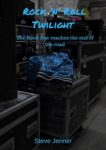 It would be an understatement to say that this has been an eventful year for the Music Riot team. Steve Jenner has had two books published in late 2018, “Rock ‘n’ Roll Twilight” and “On the Radio” (with his brother Paul) and we thought it was a perfect opportunity to showcase some of his past Music Riot escapades and demonstrate the sheer quality of his writing, not to mention his enthusiasm for and knowledge of Popular Music. Just sit back and enjoy some effervescent music writing.
It would be an understatement to say that this has been an eventful year for the Music Riot team. Steve Jenner has had two books published in late 2018, “Rock ‘n’ Roll Twilight” and “On the Radio” (with his brother Paul) and we thought it was a perfect opportunity to showcase some of his past Music Riot escapades and demonstrate the sheer quality of his writing, not to mention his enthusiasm for and knowledge of Popular Music. Just sit back and enjoy some effervescent music writing.
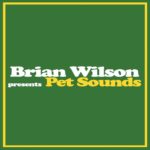 Setting the scene
Setting the scene
Here’s an example from one of the books published this year, “Rock ‘n’ Roll Twilight”, a collection of live reviews, some of which initially appeared in Music Riot. This was from a review of a Brian Wilson show:
‘My mate can drink 3 pints of lager through a straw in less time than it takes to boil a kettle.
According to some, this makes him a ‘legend’.
Brian Wilson is regarded by many as a ‘genius’.
I would argue these labels have caused problems for both men and have probably influenced their behaviour and probably not in a good way.
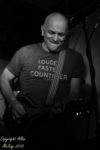 Sheer enthusiasm
Sheer enthusiasm
It’s a prerequisite for membership of the Riot Squad that you’re enthused to the point of obsession about popular music. The wordplay’s quite impressive as well:
Elvis Fontenot – an explosion of manic cajun and punk–zydeco energy. The outside area at The Cock is long and quite narrow and so if you find yourself at the front, they are In Your Face in a big way. A gurning bundle of leering, squealing, careening, lurching riot, they are Big Fun. Combining the pace of a Ska band and the intensity of punk with squeeze box and scrub–board tricks and tuneage born on the bayou, this was full of vivacious kick and naughtiness but with extremely high standards of musicianship and let’s hear it for the sound man who kept the whole thing in beautiful balance. Absolutely the best thing at the Festival so far. Mama’s Got A Squeeze Box. Somebody Sign These People – Now.
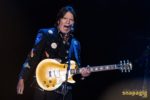
Photo courtesy of John Hayhurst.
Hilarious similes
Steve has a very creative turn of phrase. This reference to the drum sound is from a piece about the John Fogerty gig at the O2, referring to some ‘issues’ the sound crew was having during Steve Miller’s set. Steve made the comment during the set, then gave it a quick road-test later when we were backstage talking to the band. You know it’s a good line when it Makes The Band Laugh:
The keyboards, which would play an increasingly important part in the set were virtually absent; the guitars lost in a quite horrible swamp of all the things I do not appreciate which sometimes seems to be ‘the way it is done’ when an American band plays a stadium rock gig. The drums sound like someone is throwing an empty filing cabinet down a lift shaft; the bass is an intrusive, rubbery Audio Prevention Scheme.
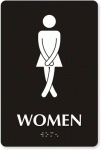 Social campaigner?
Social campaigner?
A very serious point made in Steve’s grumpy, irascible old codger voice. It’s an old technique, sing humour to make a serious point, but he does it so well:
Venues, promoters and bands themselves often bemoan the relative lack of female punters and offer various socio – politico – entertaino(?)- reasons for this. The truth is much simpler. There are not enough bogs for women. It is not rocket science. As a bloke you cruise past, cheerfully unzipping before you so much as reach the door, whilst the queue for the ladybogs has already lit a campfire and are preparing a bivouac for the night. And it’s not even a good chortle for the average bloke; they’re tricky blighters, these women. I know. I’ve been kept by one as a sort of house pet for the last forty years or so. As a token bloke, they hold you personally responsible for all life’s discomforts and they take it out on you as a representative of the foul brood who have brought them to this ignominy. Please, ye great and ye good, if you make one resolution this year, it has to be more ladybogs in music venues. And High Five to you, too.
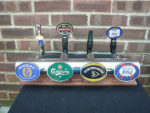 The important things in life
The important things in life
If you’ve read any of Steve’s work, you’ve probably seen a reference to beer. He enjoys a beer; proper cask-conditioned, hand-pulled beer, not cold, fizzy gnat’s pee. He enjoys a single malt as well and I could tell you a story about drinking Jack and coke after a DJ gig, but I think that has to wait a while. Anyway, back to bitter:
Now, when I go out to see a band, I like a beer. To be honest I like a beer when I don’t go out to see a band as well which is why I also have problems with 4 (Tight seats in venues – Ed). But for the sake of the good Lord, why, why oh why do some venues insist on dishing up five – count them – five – draught lagers AND NO BITTER? WHY?? Take the O2 Indigo as exhibit A. Gorgeous venue. Excellent sight lines, marvellous acoustics, washroom facilities you could picnic in – and NO BITTER! My most recent visit there was to see Little Steven and the Disciples of Soul and what a breathtaking gig that was. But it also happened to coincide with the night when the Guinness was ‘off’. (What does that even mean? It was past sell-by? It was giving off a sulphurous odour? WHAT?) And so we were offered a wide range of near-identical fizzy light brown chemical substances which could loosely be described as ‘lager’ (and don’t even try to tell me British Bud isn’t ‘lager’). I wasn’t expecting an array of twelve real ales and a couple of nice porters, but – not even John Smith’s, the last refuge of the scoundrel? Bah and humbug.

John Bulley, Steve Stott & Phil Burdett
When I get a message inviting me to visit the Railway in Southend to interview Phil Burdett, there’s only one possible response – when do I have to get there? Well, it was a mid-July Friday afternoon and the interview was livened up by the presence of Steve Stott, superb fiddle and mandolin player with Phil’s ever-evolving band. As always where Phil Burdett’s involved, it was interesting and sometimes controversial. I’ve left out some stuff to protect the innocent and the guilty – sorry Phil. Anyway, here’s how it went.
Allan – To start on familiar territory, with the last album, “Psychopastoral”, the thing that immediately struck me was releasing it as one continuous track, which gets round the whole iTunes download thing about single tracks or whole albums.
Phil – I’m sure they’re quaking in their boots at iTunes, it is a little victory but it’s the best I can hope for these days; Pyrrhic victories. I crave more Pyrrhic victories.
Allan – It took me a while to get this while I listened to it on my trusty old media player on continuous cycle as it went from the end straight back to the beginning, that the album was a cycle from the early morning to early morning a day later. I said at the time that I thought it was an outstanding piece of work, as good as anything you’ve done, I think.
Phil – I must admit, I was surprised, in the sense that it was different from what I used to do and I thought I’m either going to get some new people who like it and hate everything I’ve ever done or just everyone will hate it. You get so involved with it and you think you’re creating Wagner’s “Ring Cycle” and someone tells you ‘This doesn’t make any sense at all. What are you doing? You’ve lost your mind.’ It was pleasing that some people that liked what I do liked it and also some people some that haven’t particularly liked what I’ve done before seem to like it as well.
Steve – There’s probably some of the style that you used to do still remaining but combined with what you’re feeling now, so it covers both ends.
Phil – It’s like Tom Waits, but not quite such a radical change (that’s the next album). He lost a lot of his old fans who said ‘I liked him when he was drunk and living in a dodgy hotel and being a sort of dharma bum’, but you get bored with it. You can come up with many artistic reasons ‘I decided to embrace the idea of a concept album, in my late fifties…’, but basically you’re bored and I couldn’t get into music after the operation and the stuff I went through there. I started playing and did a couple of gigs and I felt like a Phil Burdett tribute act and I thought ‘What am I doing this for? I’m trying to write more songs like this.’ If you’re trying to write something don’t do it. So I thought let’s do something I can’t do, so we’re doing a film now.
I’ve got to do a film soundtrack; there will be songs, and that’s made me and write the songs because I think I need a song here to go over this bit of film.
Steve – There are some great songs, actually, from the demos I’ve heard.
Phil – Thank you. I hope you’ve got that on tape.
Allan – When we were chatting earlier, you were saying something the film being a bridge between “Psychopastoral” and the next album.
Phil – It is; there’s a lot of stuff I wrote in the hospital; morphine is a wonderful thing. I read it back when I sobered up and I thought I have no idea what this man is talking about, then it started making sense gradually and I realised that a lot of it followed on from what I did on the last album but I didn’t want it to be the middle album before I get really depressing with the hospital songs. I thought it wold be nice if it had some other element to it, so I thought ‘Let’s make a film!’ And directly, I thought there was no way I could make a film with on no money, no budget and no actors
Steve – Not strictly true…
Phil – So we are, and the fact that it’s actually happening is what’s keeping me going because even the prospect of doing the bunch of songs I had written felt like ‘Here we go again’ but this will spark it off and it’s also got a visual element to it, which I like the idea of. It’s not a series of music videos joined together, but you know The The did that film, I want it to have that sort of feel to it, but there’s a bit more drama involved (with a small d). We’re not talking “Apocalypse Now”, we couldn’t afford the helicopters…
Allan – And this is not the only film you’ve been involved with recently, is it?
Phil – No, I’m a regular luvvie now. ‘Just in between films, dahling’. It’s a documentary about growing up in Basildon. It was initially about brutalist architecture but it seemed to evolve when the director met a lot of artists from Basildon and they were all so different but they all had a similar theme of a love/hate relationship with Basildon so it was about that; it was good fun. He let me witter on then edited it down to something that was almost coherent, so I was quite pleased with that.
Steve – The people the film’s about, or featured in the film, have all left Basildon, haven’t they? There’s not a single one actually lives in Basildon now.
Phil – Which was hilarious. A lot of the Irish diaspora sing “From Clare to Here” and “Off to Dublin in the Green” but they’re all in Finsbury Park now. ‘We all love it but we’re not going back there. Fuck that.’
Allan – As an ex-pat Scot I completely get that. So, without giving too much away in terms of plot, what’s the story with the film?
Phil – Well the “Psychopastoral” album was basically, the narrative throughout was called ‘the long walk home’ and it’s an idea that I’ve discovered that many of the people I like, in music and literature and poetry, were always disappearing into the wilderness looking for something and what they were looking for was somewhere they could go home and that was the vague idea. A lot of them went to nature; it was based around William Blake, John Clare and Arthur Rimbaud. They all disappeared to derange their senses and they all found out they were miles from home: ‘I don’t feel at home and that’s what I wanted in the first place. I wanted to feel something.’ That’s the idea of that album and going through my traumas, I thought ‘They were all walking’.
John Clare famously walked from High Beach to Helpston; he walked from this lunatic asylum, going home to what he thought was his wife, but was actually his mistress, who had actually died anyway so it was an exercise in the definition of futility. I used him as the central character and Blake was another one who didn’t actually wander, but he wandered in his head. He was seeking angels in the trees; he was a cockney mystic, like the Russell Brand of his day. They were people who had ideas beyond their station and then realised that they wanted to get back to their station. It was the idea of comfort without being comfortable and when you derange your senses there is a sense that nothing makes sense and that can be liberating but, after a while, it becomes just derangement.
Rimbaud gave up altogether and became a gun-runner, Blake started to write about Heaven-knows-what and Clare lost his mind. He thought he was Shakespeare, he thought he was a boxer at one point. So I thought the halfway house of madness is fine because you get the little insights. When that’s happening, that’s great, but once you’re in an asylum and you’re thinking you’re Shakespeare, that’s really not useful as an artist.
Brian Wilson’s an example. Everyone thought ‘How on earth did he write “Good Vibrations”?’ Look at the stuff he wrote once he reached his destination and it’s like a five-year-old writing; wonderfully produced and interesting, but still like a five-year-old. I wanted to avoid that, so while I was in the hospital I wrote all this really depressing stuff because I thought everything was coming to an end but when I came out, I thought it’s not coming to an end but I couldn’t think in the same way as I did.
I thought it was a continuation. I’d lost a leg; Rimbaud lost a leg; Captain Ahab lost a leg searching for something and I grabbed the idea of the long walk home without a leg. That’s basically what this is all about. The further out you get, through drink, drugs, mysticism, anything, the less able you are to communicate it to people because they just think you’ve gone mad. But there’s a point just before it ends, before you do go mad, where it’s really interesting and that’s point I’m trying to hold on to in this film. And then it descends into depression and madness which is what the really interesting third album of the trilogy is about, but we’ll get to that later. I want to make it sound like Steely Dan actually because that’s the only way it’s gonna sell anything, either that or “Berlin” by Lou Reed, which I love, but it’s unlistenable to most people. This will make “Berlin” sound like Five Star
Allan– Looking beyond that, have you got any more plans for live stuff coming up?
Phil – It’s a bit tricky. I’ve lost all my mojo, although I don’t know what a Mojo is apart from a middle-class magazine for people who still like Crosby, Stills and Nash, but I don’t know. I’d like to do it but I want to have a point to it. It’s the same way I feel about the writing; I don’t want to do all this differently and feel I’ve changed my approach and then think ‘Oh, we’ll go and do some gigs’.
I’m having some poetry published at the end of the year and I’d like to include some of that in it because there’s a lot more poetry on the album. I wouldn’t mind dipping my toe in the water by doing stuff with Steve. We did a thing in a church, didn’t we?
Steve – Yeah, St Paul’s church. That was beautiful actually; it was purely acoustic, just a selection of songs that suited the venue. I suppose it was a kind of folky thing.
Phil – It was. I’d like to do that with some poetry, just to see if I can read the poetry. There’s a couple of poetry evenings here where you can just get up and read.
Steve – I think the other thing is to enjoy doing it rather than have the pressure of putting on a big gig and inviting lots of people.
Phil – When we planned to do the album launch gig, I got to the rehearsal and then thought ‘What the fuck am I doing?’. If it had all been rehearsed without me there, I might have been able to turn up and sing it but I was just sitting there thinking that I wanted to do something else, I didn’t want to be sitting there churning out this stuff. It felt it important that the whole process changed, and what I don’t want to do is just get back to ‘let’s do a gig then. All the creativity has stopped, let’s go and regurgitate it live with some feedback.’
Steve – We were doing gigs to promote the albums that we all produced, so the was the reason for the gigs.
Phil – And that’s why they’re all platinum sellers…
Steve – So the question is, do we really need to do that?
Phil – The Leigh Folk Festival, I’d like to do something there next year; not just for ‘Oh, Phil’s singing again and he’s got one leg. Oh, well done, Phil.’ Unless I have my head chopped off, I can fuckin’ sing; Ella Fitzgerald managed and I’m a better singer than she is. (Followed by a loud cackle).
Allan – I suppose the thing is, whatever you decide to do, you’ve got a great bunch of musicians working with you.
Phil – I have, just don’t tell my band. No, it’s true; I’m really appreciative of the musicians I’ve been able to talk into doing stuff for nothing because it would have been very difficult otherwise. I don’t like having a regular band. I used to but now I feel like everything we do something it’s a new band almost because we evolve with this particular bunch, except the drummers…
Allan – That’s all a bit Spinal Tap isn’t it?
Steve – I don’t even know if I’ll be on the next album…
Phil – You are, but you’re playing drums. Just don’t get the drummer’s job, because then you know you’re out. No, it is a bit Spinal Tap with the drummers. The last one did actually spontaneously combust.
Allan – I suppose, Steve, you’ve got double the chance of staying in the band, playing two instruments.
Phil – He sneaks in with a false nose and moustache. ’I’ve found a new fiddle player – fuck it’s Stott’
Steve – I try to make myself as indispensable as possible.
Phil – He does; he’s currently learning the oboe. It’s great; I’m getting in touch now because I’ve got these demos for the soundtrack of the film, so I’m going to send them the stuff and we’ll get together at some point and we’ll go and record. We’ll record it at Senor Al’s (Al Franklinos) because it’s my favourite place at the moment.
Steve – It ties in very nicely with “Psychopastoral” because of the park…
Phil – Well, the songs are very different from “Psychopastoral”, so I would like it to have some continuity and that will come from whatever Al does.
Steve – And it’s the location in Peckham, where Blake’s tree is, so there’s a catharsis there.
Phil – I’d like to point out that he used the word catharsis there. Always avoid the words journey and catharsis.
Allan – And what about some of the other collaborators on “Psychopastoral”?
Phil – One of the linking voices throughout this three-album thing will be Lyndon Morgans (Songdog) who did the narration for the album (“Psychopastoral”) and he’s going to do the narration for the film, the subsequent album and the album after that, so I’m really pleased about that. He’s an old Welsh wanderer, a Celtic wanderer and I need his Richard Burton-like authority. I’ll be making him read stuff he doesn’t understand for the next two albums.
Allan – I must admit, those links on “Psychopastoral” worked really well. His voice is fabulous for those.
Phil – It was the thing I was worried about because it was the thing that was going to make it different in a way and with my zero knowledge of arrangement of the quasi-classical stuff that’s going on in the background, it was either going to be great or it was going to be shit; there is no middle-ground. And it was almost great…
Allan – And is there anything else to throw in before we wrap it up?
Phil – There’s my collection of reggae covers… I’m looking forward, in a way, to finishing this trilogy because I don’t know what I’m going to do after that, and I never felt like that. It was always just ‘Here’s another bunch of songs that I like, I’ll record them with musicians I like and we’ll put it out and some people will like it and some won’t and then we’ll do the Leigh Folk Festival, then we’ll do this, then we’ll play The Railway’. That’s not going to happen, so I’m really interested in what I want to do after that.
Steve – I think we ought to base that on whatever the outcome of the film is. You might want to do another film.
Phil – I’d love to. I’m not sure anyone else will; I’m putting many people in to therapy with this film but that would be great. But then again, I might just think ‘I’ve done that’. I won’t do it just because I’ve made a film and invent some spurious half-arsed concept…
Steve – I was just trying to generate some work for myself…
Phil – I know you were. Talking of which, there’s a collection of folk-based songs that I want to record, so I might do that as a little side project with some real folk musicians. Radical concept, I know. It’s simple; you don’t rehearse, you just have to sober them up. That’s something I wouldn’t mind doing as a side project; it’ll be nice, it’ll be my stardust memory. It was so much better when we wrote songs…
And that was where I switched off the recorder before the descent into totally scurrilous alcohol-fuelled conversation. The Basildon film that Phil refers to is ”New Town Utopia” and it’s a fascinating exploration of the development of the town and its impact on the creative artists living there. You really should watch it.
Molly Rose Reed is one third of Underhill Rose, who featured in an album review on MusicRiot this year, and also played one of the most amazing gigs we saw this year when they ignored a power cut in Camden and played a completely acoustic set in a candlelit Green Note; if you saw it, you’ll never forget it. Molly’s sharing her favourite gigs with us (plus a few near misses).
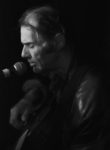 Malcolm Holcombe at the Sunflower Public House, Cathedral Quarter Arts Festival, Belfast, Ireland
Malcolm Holcombe at the Sunflower Public House, Cathedral Quarter Arts Festival, Belfast, Ireland
It was a rainy and unseasonably cold day in May, and nearing the end of Underhill Rose’s first tour to the UK. The band had the afternoon off, so we put on our coats and drove to Belfast. While holding a cup of warm coffee, sitting on a small stool to the right of the stage, I was bathed in the richness of Malcolm’s songwriting. Jared Tyler perfectly accompanied Malcolm’s dynamic guitar playing on lap steel and backing vocals. Hearing Malcolm play on the small stage to a crowded bar of intent listeners brought me home to the Swannanoa Valley of North Carolina, where Malcolm is from and also where I went to college with my bandmate Eleanor. There is nothing like being reminded of home when you are on the road.
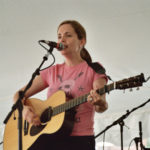 Lori McKenna at 12th and Porter, Americana Music Festival, Nashville, TN
Lori McKenna at 12th and Porter, Americana Music Festival, Nashville, TN
Her album, The Bird and the Rifle, was my introduction to this wonderful songwriter. Mostly writing hits for pop country greats like Tim McGraw, Lori McKenna’s album touched me with it’s feeling of authenticity. I could tell from the record that she feels her songs, sings from her heart and ain’t got nothin’ to prove. Seeing her live was 10 times better than the record!
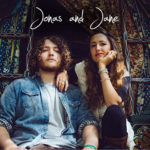 Jonas & Jane, opening for Underhill Rose at the Stables, Milton Keynes, England
Jonas & Jane, opening for Underhill Rose at the Stables, Milton Keynes, England
I admit to my bias on this Top 5 pick, but Katherine Marsh (aka Jane) and Charlie Jonas are the real deal. They sing into one microphone, and Charlie’s picking on mandolin/guitar and singing beautifully compliments Katherine’s pure voice. Their harmonies are tenderly worked and perfectly executed, and their songs will take you on a journey back in time.
 Brian Wilson performing Pet Sounds at Thomas Wolfe Auditorium, Asheville, NC
Brian Wilson performing Pet Sounds at Thomas Wolfe Auditorium, Asheville, NC
This was a once-in-a-lifetime opportunity, and worth every penny (and it was a lot of them)! I can’t even remember how many harmony parts I heard in one song. It was truly a magical night to hear the full orchestration of a work of genius.
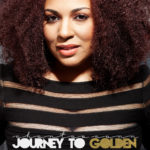 Chantae Cann at my wedding, Black Mountain, NC
Chantae Cann at my wedding, Black Mountain, NC
I had to put this one on the list, because this is one of the most memorable days of my life! Chantae is an amazing jazz singer from my hometown of Atlanta, GA. She performs her original tunes but learned “At Last” for our first dance. My family and friends danced and danced to her amazing quartet. You can see her singing with grammy-award-winning Snarky Puppy here .
Honorable Mentions:
John Paul White at the Grey Eagle, Asheville, NC
Dylan LeBlanc at the Mothlight, Asheville, NC
The Broadcast at Rockwood Music Hall, New York, NY
Steve’s been writing for us on an occasional basis for a couple of years now and his work is always worth reading. With this feature, the only stipulation we make is that the list is five items long (and we don’t always get that). Otherwise you can say whatever you like as long as the lawyers approve it. We all love going to gigs and we see a lot of live music and that’s great; we see things that we love. The downside is that the more gigs you go to, the more you see of the things that aren’t quite right. Here are some of those from Mr Jenner’s experience this year:
1) Beer – a tale of five lagers.
 Now, when I go out to see a band, I like a beer. To be honest I like a beer when I don’t go out to see a band as well which is why I also have problems with 4. But for the sake of the good Lord, why, why oh why do some venues insist on dishing up five – count them – five – draught lagers AND NO BITTER? WHY?? Take the O2 Indigo as exhibit A. Gorgeous venue. Excellent sight lines, marvellous acoustics, washroom facilities you could picnic in – and NO BITTER! My most recent visit there was to see Little Steven and the Disciples of Soul and what a breathtaking gig that was. But it also happened to coincide with the night when the Guinness was ‘off’. (What does that even mean? It was past sell-by? It was giving off a sulphurous odour? WHAT?) And so we were offered a wide range of near – identical fizzy light brown chemical substances which could loosely be described as ‘lager’ (and don’t even try to tell me British Bud isn’t ‘lager’). I wasn’t expecting an array of twelve real ales and a couple of nice porters, but – not even John Smith’s, the last refuge of the scoundrel? Bah and humbug.
Now, when I go out to see a band, I like a beer. To be honest I like a beer when I don’t go out to see a band as well which is why I also have problems with 4. But for the sake of the good Lord, why, why oh why do some venues insist on dishing up five – count them – five – draught lagers AND NO BITTER? WHY?? Take the O2 Indigo as exhibit A. Gorgeous venue. Excellent sight lines, marvellous acoustics, washroom facilities you could picnic in – and NO BITTER! My most recent visit there was to see Little Steven and the Disciples of Soul and what a breathtaking gig that was. But it also happened to coincide with the night when the Guinness was ‘off’. (What does that even mean? It was past sell-by? It was giving off a sulphurous odour? WHAT?) And so we were offered a wide range of near – identical fizzy light brown chemical substances which could loosely be described as ‘lager’ (and don’t even try to tell me British Bud isn’t ‘lager’). I wasn’t expecting an array of twelve real ales and a couple of nice porters, but – not even John Smith’s, the last refuge of the scoundrel? Bah and humbug.
2) Music Before The Event.
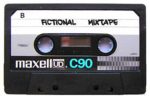 Music selection before the band comes on can be a very mixed bag. This seems to vary between ‘let the roadies pick it, we couldn’t care less’, or ‘let’s put the support band’s album on, we couldn’t care less’ through to ‘I’m the bass player and I’m going to treat you to a selection from the very darkest corners of my record collection – a variety of tracks so obscure you’ll only just recognise them as ‘music’, and that means I’ve won….’ I feel pre – gig music choice is deceptively important. It sets the mood and tone and can almost be seen as a statement of intent. Try not to do any of the above. Might I suggest a suitable pre-set approach might be along the lines of; ‘these are the songs written by others that we wish we’d recorded, played by other artists we admire’. That’d do it, generally speaking. Special mention to Brian Wilson at Brighton who seemed somehow to have managed to persuade the ghost of the James Last Orchestra (ask your grandma) to record a medley of his greatest hits. Strangely mesmeric and it worked!
Music selection before the band comes on can be a very mixed bag. This seems to vary between ‘let the roadies pick it, we couldn’t care less’, or ‘let’s put the support band’s album on, we couldn’t care less’ through to ‘I’m the bass player and I’m going to treat you to a selection from the very darkest corners of my record collection – a variety of tracks so obscure you’ll only just recognise them as ‘music’, and that means I’ve won….’ I feel pre – gig music choice is deceptively important. It sets the mood and tone and can almost be seen as a statement of intent. Try not to do any of the above. Might I suggest a suitable pre-set approach might be along the lines of; ‘these are the songs written by others that we wish we’d recorded, played by other artists we admire’. That’d do it, generally speaking. Special mention to Brian Wilson at Brighton who seemed somehow to have managed to persuade the ghost of the James Last Orchestra (ask your grandma) to record a medley of his greatest hits. Strangely mesmeric and it worked!
3) Support Band PA.
 It’s the oldest trick in the Guinness book of gig skulduggery – get your sound engineer to torpedo the mix for the support act. Sure helps you look even better when you come on. But really; do headline bands STILL need to be doing this to the poor souls who have ventured forth to warm up the crowd for them to entertain? We went to see Jools Holland at Ipswich Regent recently. The sound for the support band was so poor that even if my life depended on it I couldn’t tell you the name of the band or indeed the title of any of their songs. OK, maybe it was the band’s own fault, maybe it was nothing to do with the main act’s PA crew. But it still often is, and come on guys, we’re better than this. Especially when the support band has been hand-picked by the headliners because they think they’ve got something. There’s no kindness or even particular advantage in handing over a poisoned chalice. And why headliners keep referring to the poor dears as ‘Special Guests’ whilst abusing them thus is a bit of a laugh. If you were a guest in anyone’s house and they treated you like that you’d be on Facebook like a shot and don’t try to tell me otherwise.
It’s the oldest trick in the Guinness book of gig skulduggery – get your sound engineer to torpedo the mix for the support act. Sure helps you look even better when you come on. But really; do headline bands STILL need to be doing this to the poor souls who have ventured forth to warm up the crowd for them to entertain? We went to see Jools Holland at Ipswich Regent recently. The sound for the support band was so poor that even if my life depended on it I couldn’t tell you the name of the band or indeed the title of any of their songs. OK, maybe it was the band’s own fault, maybe it was nothing to do with the main act’s PA crew. But it still often is, and come on guys, we’re better than this. Especially when the support band has been hand-picked by the headliners because they think they’ve got something. There’s no kindness or even particular advantage in handing over a poisoned chalice. And why headliners keep referring to the poor dears as ‘Special Guests’ whilst abusing them thus is a bit of a laugh. If you were a guest in anyone’s house and they treated you like that you’d be on Facebook like a shot and don’t try to tell me otherwise.
4) Slim Seats (Is Not A Slide Guitar Player).
 I’m sitting on my chair at the rather lovely MEN Arena. As big venues go, it is not a bad watch and very user friendly to get in and out of. If only the same could be said of the chairs. They seem to use this system where the ‘temporary’ seating in the auditorium kind of clips together in a very intimate way; and the chairs are slightly smaller than Ryanair to start with, and they are by no means alone in this. And, as luck would have it, a similarly ‘bonny’ bloke appears to be the tenant of seat K27, the seat which is cheek – literally – by jowl with The Author. Flopping down adjacent to me, spilling one of five types of homogenous lager on my arm and presenting profuse apologies through a mouthful of stadium dog, I’m already feeling my sixty – odd – quid entertainment experience is being compromised. Ken Dodd better be pretty damn good now.
I’m sitting on my chair at the rather lovely MEN Arena. As big venues go, it is not a bad watch and very user friendly to get in and out of. If only the same could be said of the chairs. They seem to use this system where the ‘temporary’ seating in the auditorium kind of clips together in a very intimate way; and the chairs are slightly smaller than Ryanair to start with, and they are by no means alone in this. And, as luck would have it, a similarly ‘bonny’ bloke appears to be the tenant of seat K27, the seat which is cheek – literally – by jowl with The Author. Flopping down adjacent to me, spilling one of five types of homogenous lager on my arm and presenting profuse apologies through a mouthful of stadium dog, I’m already feeling my sixty – odd – quid entertainment experience is being compromised. Ken Dodd better be pretty damn good now.
5) (Ain’t Got Nothin’ But) The Ladybog Blues (Again Mama).
 Venues, promoters and bands themselves often bemoan the relative lack of female punters and offer various socio – politico – entertaino(?)- reasons for this. The truth is much simpler. There are not enough bogs for women. It is not rocket science. As a bloke you cruise past, cheerfully unzipping before you so much as reach the door, whilst the queue for the ladybogs has already lit a campfire and are preparing a bivouac for the night. And it’s not even a good chortle for the average bloke; they’re tricky blighters, these women. I know. I’ve been kept by one as a sort of house pet for the last forty years or so. As a token bloke, they hold you personally responsible for all life’s discomforts and they take it out on you as a representative of the foul brood who have brought them to this ignominy. Please, ye great and ye good, if you make one resolution this year, it has to be more ladybogs in music venues. And High Five to you, too.
Venues, promoters and bands themselves often bemoan the relative lack of female punters and offer various socio – politico – entertaino(?)- reasons for this. The truth is much simpler. There are not enough bogs for women. It is not rocket science. As a bloke you cruise past, cheerfully unzipping before you so much as reach the door, whilst the queue for the ladybogs has already lit a campfire and are preparing a bivouac for the night. And it’s not even a good chortle for the average bloke; they’re tricky blighters, these women. I know. I’ve been kept by one as a sort of house pet for the last forty years or so. As a token bloke, they hold you personally responsible for all life’s discomforts and they take it out on you as a representative of the foul brood who have brought them to this ignominy. Please, ye great and ye good, if you make one resolution this year, it has to be more ladybogs in music venues. And High Five to you, too.
So, here we go with the first of our guest contributions to this year’s High Fives. Phil Burdett is a singer-songwriter from Essex whose album “Dunfearing and the West Country High” was one of Allan’s top 5 albums for the year. He’s a very entertaining interviewee and he’s a great guy to have a beer (or several) with. Anyway, here are Phil’s favourite five musical events of 2014:
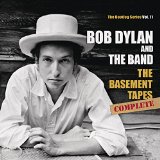 Release of Bob Dylan’s complete “Basement Tapes” Read more
Release of Bob Dylan’s complete “Basement Tapes” Read more


